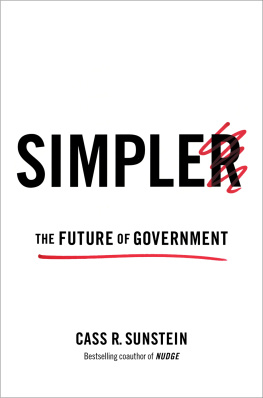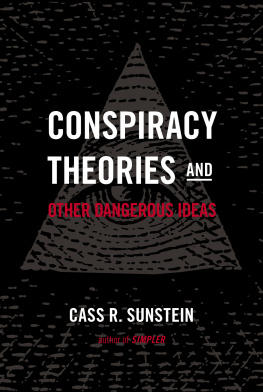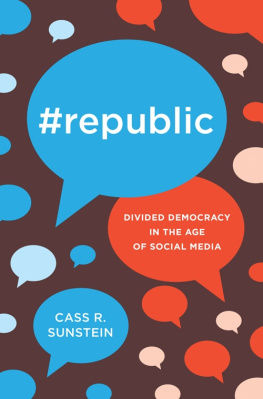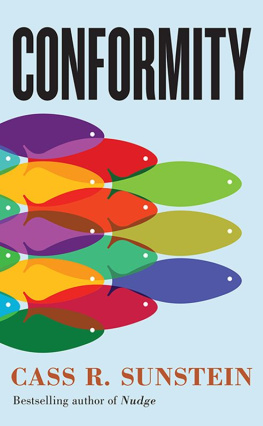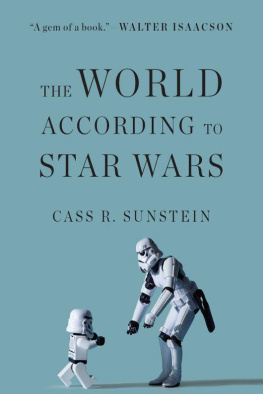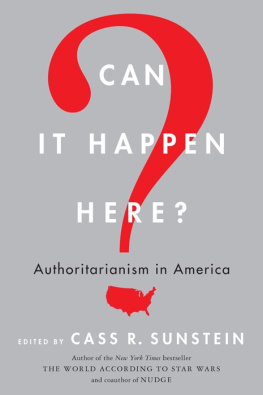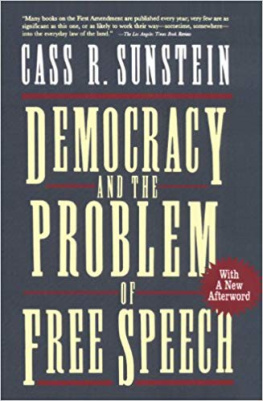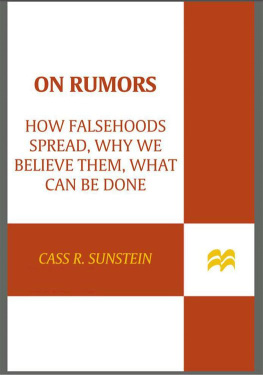Cass R. Sunstein - Sludge: What Stops Us from Getting Things Done and What to Do about It
Here you can read online Cass R. Sunstein - Sludge: What Stops Us from Getting Things Done and What to Do about It full text of the book (entire story) in english for free. Download pdf and epub, get meaning, cover and reviews about this ebook. publisher: MIT Press, genre: Politics. Description of the work, (preface) as well as reviews are available. Best literature library LitArk.com created for fans of good reading and offers a wide selection of genres:
Romance novel
Science fiction
Adventure
Detective
Science
History
Home and family
Prose
Art
Politics
Computer
Non-fiction
Religion
Business
Children
Humor
Choose a favorite category and find really read worthwhile books. Enjoy immersion in the world of imagination, feel the emotions of the characters or learn something new for yourself, make an fascinating discovery.

- Book:Sludge: What Stops Us from Getting Things Done and What to Do about It
- Author:
- Publisher:MIT Press
- Genre:
- Rating:3 / 5
- Favourites:Add to favourites
- Your mark:
- 60
- 1
- 2
- 3
- 4
- 5
Sludge: What Stops Us from Getting Things Done and What to Do about It: summary, description and annotation
We offer to read an annotation, description, summary or preface (depends on what the author of the book "Sludge: What Stops Us from Getting Things Done and What to Do about It" wrote himself). If you haven't found the necessary information about the book — write in the comments, we will try to find it.
Cass R. Sunstein: author's other books
Who wrote Sludge: What Stops Us from Getting Things Done and What to Do about It? Find out the surname, the name of the author of the book and a list of all author's works by series.
Sludge: What Stops Us from Getting Things Done and What to Do about It — read online for free the complete book (whole text) full work
Below is the text of the book, divided by pages. System saving the place of the last page read, allows you to conveniently read the book "Sludge: What Stops Us from Getting Things Done and What to Do about It" online for free, without having to search again every time where you left off. Put a bookmark, and you can go to the page where you finished reading at any time.
Font size:
Interval:
Bookmark:
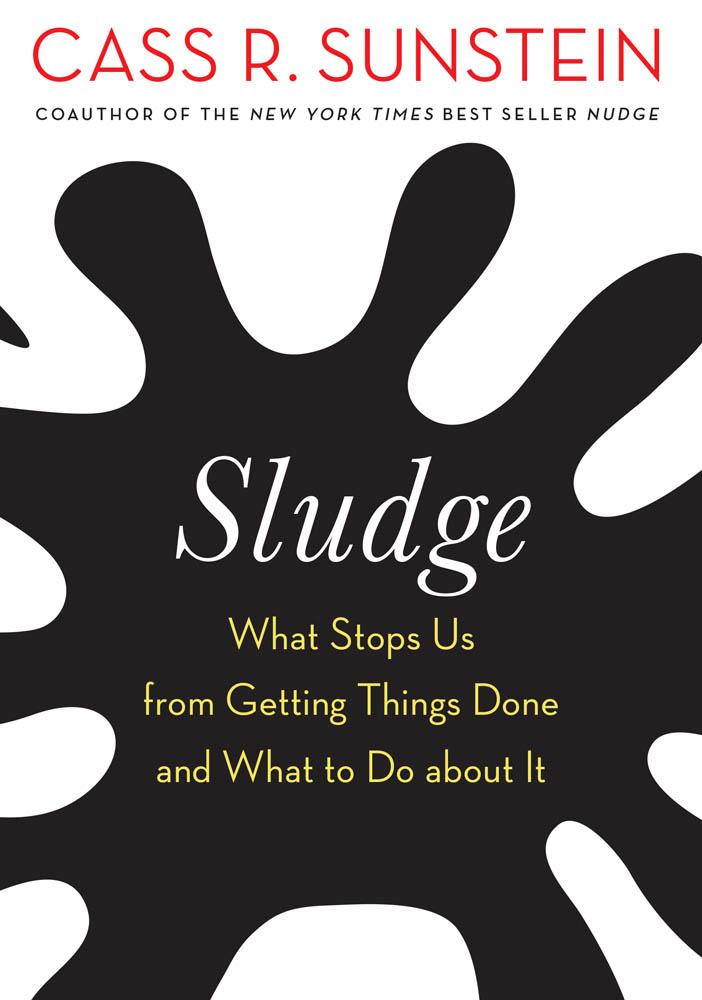
Sludge
What Stops Us from Getting Things Done and
What to Do about It
Cass R. Sunstein
The MIT Press
Cambridge, Massachusetts|London, England
2021 Cass R. Sunstein
All rights reserved. No part of this book may be reproduced in any form by any electronic or mechanical means (including photocopying, recording, or information storage and retrieval) without permission in writing from the publisher.
Library of Congress Cataloging-in-Publication Data
Names: Sunstein, Cass R., author.
Title: Sludge : what stops us from getting things done and what to do about it / Cass R. Sunstein.
Description: Cambridge, Massachusetts : The MIT Press, 2021. | Includes bibliographical references and index.
Identifiers: LCCN 2020033683 | ISBN 9780262045780 (hardcover)
Subjects: LCSH: Bureaucracy--United States. | Administrative procedure--United States. | Government paperwork--United States. | Paperwork (Office practice)--United States.
Classification: LCC JK421 .S885 2021 | DDC 302.3/50973--dc23
LC record available at https://lccn.loc.gov/2020033683
d_r0
Sludge. noun. Thick, soft, wet mud or a similar viscous mixture of liquid and solid components, especially the product of an industrial or refining process.
Oxford Online Dictionary, 2019
- List of Table
This book is a product of a failure. During the presidency of Barack Obama, I was privileged to serve as the administrator of the White House Office of Information and Regulatory AffairsOIRA, as it is called. OIRA is an obscure office, with a small staff of about fifty people, but it plays a significant role in the US government. It helps oversee the operation of the regulatory state, including health care, environmental protection, civil rights, highway safety, occupational health, food safety, agriculture, even homeland security. But it was originally created by the Paperwork Reduction Act (PRA), enacted in 1980, and one of its central missions is, well, to reduce paperwork.
Which brings me to the failure. For most of my time at OIRA, I was focused on large and dramatic issues: economic growth, health care reform, financial stability, climate change, clean air, clean water, race and sex discrimination, public health, highway safety. Paperwork reduction mattered, for sure, but it was not the highest priority. That wasnt exactly wrong, but it wasnt quite right, either. Countless programs, potentially benefiting so many people, end up failing because of excessive paperwork. Sometimes administrative burdens reduce economic growth and produce widespread unfairness. They even make people sick.
Sometimes the victims are businesses: from the largest to the smallest, from the well-established to start-ups. Sometimes the victims are people who need some kind of license or permit, perhaps to work. Sometimes the victims are the most vulnerable members of society: people who are in poor health, disabled, depressed, elderly, or poor. Sometimes paperwork and associated burdens hammer identifiable groups, including women and people of color. It was not until relatively late in my four-year stint that my team and I began to go hard at the problem. It was too late, and it was too little.
In the years since that time, we have learned an immense amount about the damage done by paperwork requirements, waiting time, reporting requirements, clearance processes, and the like. Some of what we have learned involves what is actually happening on the groundwhat public officials are doing to people, and how they are harming them, by making them jump through an assortment of hoops. Some of what we have learned involves the human mind and its limits, which help to explain why such burdens can be so devastating. Some of what we have learned involves the private sector, which can damage its customers, and its own employees, by imposing sludge.
In many cases, officials themselves have no clue about the consequences of paperwork and related requirements. In many other cases, they know exactly what they are doing. That is true of hospitals, businesses, universities, and other institutions as well.
When people are required to jump through hoops, all sorts of bad things might happen, some of them surprising. One of the least surprising is that many people stop jumping. That might be a reasonable thing to do or essential to peoples self-preservation, but in many cases it is also a kind of tragedy. The good news is that a lot can be done to help.
A roadmap of what is to come: Chapter 1 clarifies the key concepts and offers a short account of the underlying problem. Chapter 2 investigates why sludge is so harmful, with special reference to behavioral science. It emphasizes the problems of inertia, present bias, and scarcity (cognitive, not economic). In combination, these are a potent brew. They help account for the damage done by sludgemuch more, often, than anyone ever intended.
Chapter 3 explains that sludge is a product of architecture. Sometimes deliberately, sometimes by accident, it has a major effect on outcomes. It could easily be otherwise. Chapter 4 offers a brisk, illustrative tour of the not-wonderful world of sludge, with reference to benefit programs, occupational licensing, student visas, and constitutional rights. Different people, with different values, will have different reactions to the level of burdens in different areasbut with respect to sludge, there is a great deal of room for people who disagree on fundamental issues to make common cause.
Chapter 5 investigates the legitimate reasons for sludgeabove all, program integrity, which means that sludge can be a way to ensure that people who apply for things actually deserve to get them. People should not receive money to which they are not entitled, and sludge helps to prevent unjustified receipts. Record-keeping can also be important; public and private institutions impose sludge to ensure that they can learn how programs are doing. In addition, sludge can be a way of preventing recklessness and impulsiveness; it can increase the likelihood that people really want to do what they are about to do. By emphasizing justifications for sludge, chapter 5 can be seen as an effort to restore the balance.
Chapter 6 elaborates the idea of Sludge Audits, and urges that they are likely to pay large dividends. The government should be conducting many of them. The same is true of private institutions, which could save a lot of money and a lot of time and improve well-being for countless people (including their own employees). Chapter 6 also explores potential legal reforms, coming from all branches of government. While my focus here is on the United States, my hope is that these reforms can be adopted in many nations.
Chapter 7 is a brief manifesto, identifying the most precious thing that human beings are blessed to have.
In all likelihood, your life has been made worse because of sludgea viscous mixture, consisting of frictions that prevent you from doing what you want to do or from going where you want to go. My first goal here is to understand why sludge is so harmful. My second goal is to see what might be done to reduce that harm.
Sludge comes from private and public institutions. It comes from small companies and from large ones. It comes from national governments and from state and local authorities. It comes from the United Nations, the European Commission, and the World Bank. Lawyers impose sludge. So do courts. So do doctors and hospitals. Banks certainly impose sludge. Although the problem of sludge is worse in some countries than in others, it can be found in every nation on the planet. And while my focus is on the United States, the basic lessons are much broader. Sludge is built into the human condition, and we need to start to remove it, piece by piece.
Font size:
Interval:
Bookmark:
Similar books «Sludge: What Stops Us from Getting Things Done and What to Do about It»
Look at similar books to Sludge: What Stops Us from Getting Things Done and What to Do about It. We have selected literature similar in name and meaning in the hope of providing readers with more options to find new, interesting, not yet read works.
Discussion, reviews of the book Sludge: What Stops Us from Getting Things Done and What to Do about It and just readers' own opinions. Leave your comments, write what you think about the work, its meaning or the main characters. Specify what exactly you liked and what you didn't like, and why you think so.

